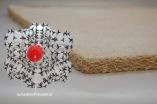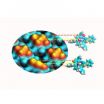(Press-News.org) Since the 50s, formaldehyde has been the basic material for many artificial resins and glues used in particleboards and plywood boards. Estimates indicate that more than 85 percent of all wood materials have adhesives containing formaldehyde. This substance escapes from the materials and, along with other sources, pollutes indoor air. This is why numerous ways have been developed to reduce emissions, and the International Agency for Research on Cancer (IARC) of the World Health Organization WHO has even classified formaldehyde as carcinogenic for humans. Thereupon both the existing threshold value of 0.1 ppm issued by Germany's then-Federal Health Office in 1977 and WHO's standard value of 100 micrograms per cubic meter (µg/m³) have been confirmed.
Researchers at the Fraunhofer Institute for Wood Research, Wilhelm-Klauditz-Institut WKI in Braunschweig, Germany, and the Fraunhofer Institute for Silicate Research ISC in Würzburg, Germany, have found a new method to reduce formaldehyde emissions from particleboard: modified zeolites. These are aluminosilicates that function as a molecular sieve due to their extremely large inner surface and porous structure so that they can absorb formaldehyde particularly well. Dr. Katrin Bokelmann ought to know because she is the project manager at the Fraunhofer Institute for Silicate Research who, along with her team, is in charge of manufacturing mineral compounds. As she puts it: "Zeolites are already used as a filling material in particleboards, but it's an entirely new idea to use them for adsorbing pollutants in wood materials."
The researchers were not able to achieve sufficiently high rates of adsorption in their tests of various commercially available or natural minerals. The best adsorption properties of these aluminosilicates were measured in synthetic zeolite Y, which the experts modified and improved with amino groups. Dr. Jan Gunschera is the project manager at the Fraunhofer Institute for Wood Research and this is how he sees it: "We noticed a 70 percent boost in the adsorption rate after we added formaldehyde to the processed material in our measuring chambers and then we put five percent by weight of the zeolite powder directly into our sample particleboards made of spruce roundwood. The result was that formaldehyde emissions from the board dropped 40 percent – both short-term and long-term tests of one month confirm these findings. In other words, the air in living spaces should be measurably improved. Our tests indicate that this technology can even reduce indoor air pollutant levels." The properties of the wood materials did not undergo any negative influence from the zeolites, it was reported.
The researchers have applied for a patent for the new technique and think that modified zeolites – worked into furniture or ceiling panels – could conceivably reduce not only formaldehyde but also other aldehyde levels in indoor air. Scientists are currently looking for partners from the wood materials industry to mass-produce particleboards. A sample panel is on display at the Bau fair in Munich, Germany, from January 17 to 22 at Fraunhofer's joint stand 131 in Hall C2.
INFORMATION:
Minerals provide better indoor air
2011-01-11
ELSE PRESS RELEASES FROM THIS DATE:
Social class and changes in mortality from liver cirrhosis over the 20th Century
2011-01-11
A paper describing a dramatic change during the 20th century in England and Wales in the association between social class and mortality from liver cirrhosis features in Alcohol and Alcoholism. While deaths from cirrhosis were more common among higher social classes in the early part of the century, the pattern changed so that deaths from cirrhosis were much more common among the lower social classes by the end of the century. Data on male cirrhosis mortality by social class were obtained from the Registrar General's Decennial Supplements for the years 1921�.
The ...
Researchers show how Alzheimer's plaques lead to loss of nitric oxide in brain
2011-01-11
PITTSBURGH, Jan. 10 – A researcher at the University of Pittsburgh School of Medicine, in collaboration with scientists from the National Institutes of Health (NIH), has discovered that the deadly plaques of Alzheimer's disease interact with certain cellular proteins to inhibit normal signals that maintain blood flow to the brain. Their findings, which could lead to new approaches to treat the dementia, were recently published in Public Library of Science One.
Levels of nitric oxide (NO) – a signaling molecule that helps regulate blood flow, immune and neurological processes ...
Species loss tied to ecosystem collapse and recovery
2011-01-11
PROVIDENCE, R.I. [Brown University] — The world's oceans are under siege. Conservation biologists regularly note the precipitous decline of key species, such as cod, bluefin tuna, swordfish and sharks. Lose enough of these top-line predators (among other species), and the fear is that the oceanic web of life may collapse.
In a new paper in Geology, researchers at Brown University and the University of Washington used a group of marine creatures similar to today's nautilus to examine the collapse of marine ecosystems that coincided with two of the greatest mass extinctions ...
Early investigations promising for detecting metastatic breast cancer cells
2011-01-11
Research by engineers and cancer biologists at Virginia Tech indicate that using specific silicon microdevices might provide a new way to screen breast cancer cells' ability to metastasize.
An image of their work provided to Biomaterials was selected as one of the 12 best biomaterials-related images published in the journal's 2010 catalogue. http://www.elsevierscitech.com/pdfs/Biomaterials_2010.pdf
The Virginia Tech researchers are: Masoud Agah, director of Virginia Tech's Microelectromechanical Systems Laboratory (MEMS) Laboratory in the Bradley Department of Electrical ...
Research identifies drug target for prion diseases, 'mad cow'
2011-01-11
LEXINGTON, Ky. (Jan. 4, 2011) − Scientists at the University of Kentucky have discovered that plasminogen, a protein used by the body to break up blood clots, speeds up the progress of prion diseases such as mad cow disease.
This finding makes plasminogen a promising new target for the development of drugs to treat prion diseases in humans and animals, says study senior author Chongsuk Ryou, a researcher at the UK Sanders-Brown Center on Aging and professor of microbiology, immunology and molecular genetics in the UK College of Medicine.
"I hope that our study ...
Earth: Finding new oil and gas frontiers
2011-01-11
Alexandria, VA – Where to next in the search for oil and gas? EARTH examines several possible new frontiers - including the Arctic, the Falkland Islands, the Levant, Trinidad and Tobago and Sudan - where oil and gas exploration are starting to take hold. One of those places, Sudan, is in the news for other reasons: South Sudan voted yesterday on whether to secede from North Sudan.
But given that South Sudan holds more than 70 percent of Sudan's 5 billion to 6 billion barrels of proven reserves, a lot in this election hinges on oil. If South Sudan does secede, how will ...
Carnegie Mellon researchers identify 'Facebook neurons'
2011-01-11
PITTSBURGH—Carnegie Mellon University researchers have found that within the brain's neocortex lies a subnetwork of highly active neurons that behave much like people in social networks. Like Facebook, these neuronal networks have a small population of highly active members who give and receive more information than the majority of other members, says Alison Barth, associate professor of biological sciences at Carnegie Mellon and a member of the Center for the Neural Basis of Cognition (CNBC). By identifying these neurons, scientists will now be able to study them further ...
Study: Outsourcing hurts consumers by softening competition among firms
2011-01-11
CHAMPAIGN, Ill. – Firms that outsource aspects of their business to a foreign country may profit by saving money, but the practice tends to soften the competition among industry rivals, exacting a hidden cost on consumers, says new research co-written by a University of Illinois business administration professor.
Yunchuan "Frank" Liu says outsourcing hurts society in two ways – it results in lost jobs for workers, and in consumers paying higher prices than they should for goods.
"Outsourcing is a topic that affects just about everyone, and the general consensus is that ...
Direct observation of carbon monoxide binding to metal-porphyrines
2011-01-11
The mechanism for binding oxygen to metalloporphyrins is a vital process for oxygen-breathing organisms. Understanding how small gas molecules are chemically bound to the metal complex is also important in catalysis or the implementation of chemical sensors. When investigating these binding mechanisms, scientists use porphyrin rings with a central cobalt or iron atom. They coat a copper or silver support surface with these substances.
An important characteristic of porphyrins is their conformational flexibility. Recent research has shown that each specific geometric configuration ...
Study finds nearly half of school social workers feel unequipped to handle cyberbullying
2011-01-11
Instances of cyber bullying continue to make news nearly every day, and while it's recognized as a problem among most school-aged children, a new study published this month in Children & Schools and coauthored by Temple University social work professor Jonathan Singer finds that nearly half of school social workers feel they are ill equipped to handle it.
"School social workers provide more crisis intervention services than any other school staff member – more than counselors, nurses, teachers, or psychologists," said Singer. "As a result, school social workers are a ...





